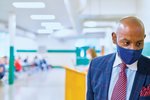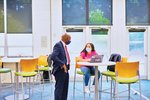

Every year of Oliver Ewy’s high school career has taken place during a pandemic.
That’s why Ewy, a junior at Northwood High School, is excited to finally go to school in-person every day of the week.
“I enjoyed it, it was a little different,” he said of the first week of school. “It is nice to have a somewhat normal schedule, like before the pandemic. And I’m definitely glad also that a lot of activities have returned.”
Chatham County Schools started classes last Monday, marking the third year impacted by COVID-19 and the first with daily in-person school since before the pandemic. Students and staff still wore masks, regardless of vaccination status, in response to the spread of the Delta variant and guidance from public health officials.
A spectrum of opinions among students and staff exist regarding masking in schools, but nearly all are pleased to learn daily in the school building. Following more than a year of COVID-19-related obstacles — increased workload for teachers, remote learning, isolation for students and mental health and academic challenges — there’s a strong communal desire to stay in schools — but to do so safely. The disagreement centers around what is safe and what isn’t, even as health officials unifiedly recommend masking and social distancing.
A new survey funded by the CDC found that from a sample of 1,448 public school parents and guardians showed many parents — especially Black and Hispanic parents — are worried enough about the Delta variant that they’d rather keep their children home to learn remotely, at least part time. Only 43% of parents wanted full-time in-person school for their students, following the CDC’s updated guidance on July 27 to account for the Delta variant. Before that guidance, 58% of those surveyed said they wanted their children in a classroom full time this year.
“We still have the mask mandate for school, and I really appreciate that,” Ewy said, “I was thinking over the summer, ‘Oh, I really hope they keep that in place.’ Because I know I wouldn’t have felt super safe if they weren’t requiring it, so I’m glad they have it.”
The first week of class, there were 56 positive COVID-19 cases among CCS campuses — .53% of the district population — though none were identified as a cluster. A cluster is defined as five or more cases that are related, not just five or more cases in the same building.
As of Wednesday morning, there were 21 active COVID-19 cases in the district, and one cluster at Chatham Central High School, or five cases.
Superintendent Anthony Jackson told the county’s board of education at its Aug. 5 meeting that masking was a vital element to keeping students in schools this year.
“We can’t give them normal, but our goal is to give them at least a routine,” he said. “Just by masking we can go to some level of normalization … or at least a routine that’s predictable.”
Though masking dominates much of conversations and coverage about schools as of late, there are many more COVID-19 protocols and policies involved in school planning.
While masking and social distancing protocols (3-foot distance requirements) will continue at CCS this year, other protocols have changed. For example, under new state guidance, schools no longer need to do symptom screenings for students and staff at the beginning of a school day. Disinfecting and cleaning processes — created in conjunction with Chatham County Public Health Department and the district’s supplier of custodial supplies — include daily cleaning of touch surfaces, cleaning of buses after morning and afternoon routes and frequent cleaning of main offices, reception areas and restrooms in schools.
(To learn more about specific COVID-19 protocols at CCS this year, refer to the adjacent breakout box, or view that article here.)
The quarantine guidelines are also different this year, under state guidelines. If a student tests positive for COVID-19 but was masked, CCS will not enforce a two-week quarantine period for students potentially exposed to that student — so long as those students were also masked. Students identifed as close contacts must quarantine for 10 days; vaccinated teachers are not required to quarantine.
The district defines a close contact as someone “within 3 to 6 feet of an infected person and incorrect mask use.”
At Northwood, Ewy said teachers keep disinfectant and hand sanitizer in their classrooms, and baskets with masks hang in the hallways for students that need them.
“I think that’s a really good idea that they started doing this year,” he said.
Northwood High School English teacher Eliza Brinkley, who was a vocal proponent for continued masking and social distancing last year, said the first day of school was a success.
“It felt great to be back in person and on a typical schedule,” Brinkley said. “I also am feeling safe since our administrators have been very clear that mask wearing is a must for everyone.”
The return to a fast-paced day this year will take some getting used to, Brinkley said, “since things just generally moved more slowly for the past year and a half, even when we got back to in person last spring.”
Among his peers, Ewy said some students also said the school day felt longer this year after a year and a half of some form of remote learning. Still, mostly everyone — including his teachers — have said how glad they are to be back in person.
“I like being able to interact with the people that I didn’t really get to see so much last year, because a lot of people did continue with online for the rest of the year,” he said. “It’s nice getting to see friends that I didn’t really get to see a lot last year, and then also marching band — that’s one of my favorite school classes and activities, and I’m just really excited about getting to do that this year.”
Chatham Rep. Robert Reives II (D-Dist.54), told the News + Record CCS’s masking policies will “ensure the safety” of students and educators while also staying in-person.
“Dozens of districts across the state have had to reverse course after starting the school year on the wrong foot, but Chatham County Schools took a cautious approach that will maximize the chances of a somewhat normal school year,” Reives said.
At the time of the district’s Aug. 5 meeting, at least 48 school districts had defied state masking guidance, opting instead to make masking optional in schools. Since then, more than 30 districts have reversed course in response to clusters in school or further evidence of the delta variant; 14 of N.C.’s 115 total districts had said they will allow masks to be optional as of Tuesday afternoon. All of those districts are in areas that voted for former president Donald Trump in the 2020 presidential election, The News & Observer reported.
“As educators and students get back into the routine of a new year, keep them in your thoughts,” Reives said. “Remember the difficult work they face in normal years, and the added stress we all face working in uncertain times.”
For Ewy and other students, they hope one thing: to be able to stay in school. While he’d “much rather go back online” if the situation is unsafe, he’s hopeful current protocols will remain in place and help mitigate increased community spread.
“I mostly hope that we can stay in school and that we don’t have another outbreak or something this winter with the Delta variant,” he said. “That’s something that does worry me — that we’re gonna go back online again. Which, I could deal with that, but I would prefer to stay in school.”
This story was updated after publication to include information on a new CDC survey.
Reporter Hannah McClellan can be reached at hannah@chathamnr.com or on Twitter at @HannerMcClellan.